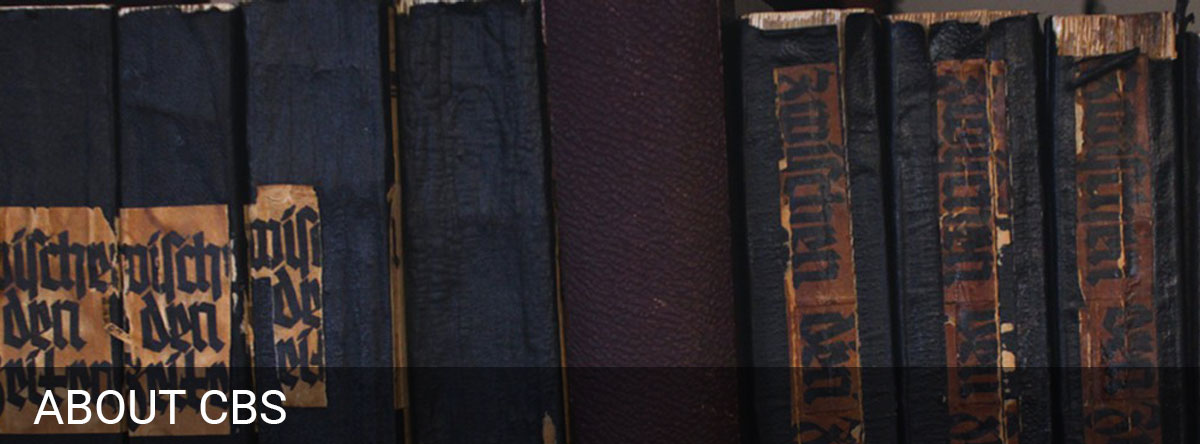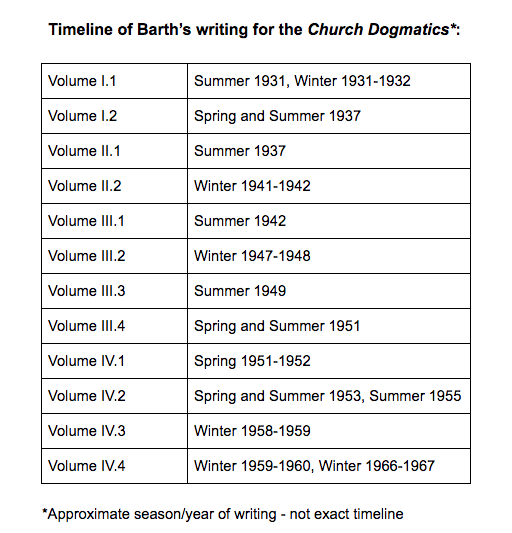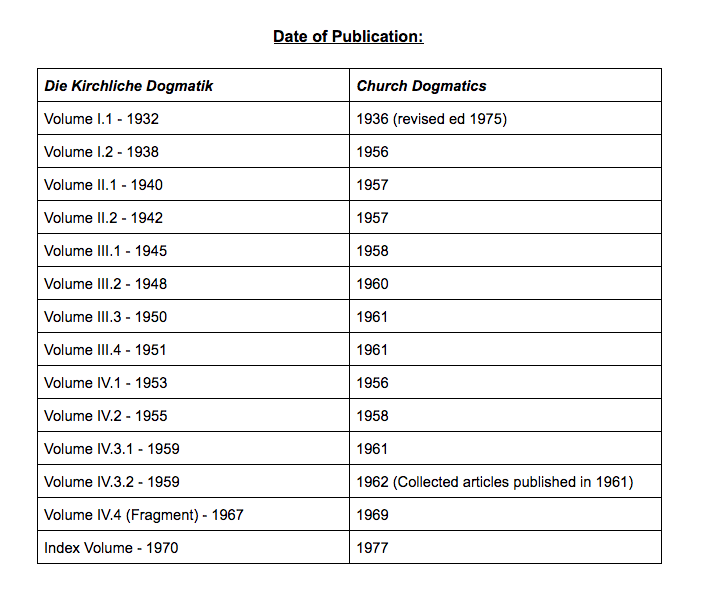We are happy to hear about your interest in Barth’s theology. Here are a list of helpful introductory books both by Barth and his interpreters (titles are linked):
Books by Barth:
- Dogmatics in Outline. London: SCM Press, 2001. An early writing of Barth’s that serves as a commentary on the Creed.
- Evangelical Theology: An Introduction. Grover Foley, trans. London: Weidenfeld and Nicolson, 1963. This highly readable volume is based on the lectures that Barth delivered during his 1962 visit to the United States.
- The Goettingen Dogmatics: Instruction in the Christian Religion. Edited by Hannelotte Reiffen and translated by Geoffrey W. Bromiley. Grand Rapids: Eerdmans, 1991
- The Humanity of God. Translated by John Newton Thomas and Thomas Wieser. Louisville: Westminster John Knox Press, 1960.
Introductory Resources by Barth Interpreters:
- Balthasar, Hans Urs von. The Theology of Karl Barth, Edward T. Oakes, trans. San Francisco: Ignatius, 1992.
- Busch, Eberhard. Karl Barth: His Life from Letters and Autobiographical Texts. John Bowden, trans. Eugene: Wipf and Stock, 2005.
- _________________. The Great Passion: An Introduction to Karl Barth’s Theology. Grand Rapids: Eerdmans, 2004
- Mangina, Joseph. Karl Barth: Theologian of Christian Witness. Louisville: Westminster John Knox Press, 2004
- Morgan, D. Densil. The SPCK Introduction to Karl Barth. London: The Society for Promoting Christian Knowledge, 2010.
- Webster, John. Barth. 2nd ed. London: Bloomsbury Academic, 2004.
- _______________, ed. The Cambridge Companion to Barth. Cambridge: Cambridge University Press, 2000.
Reading Aids for Barth’s Church Dogmatics:
- Allen, Michael. Karl Barth’s Church Dogmatics: An Introduction and Reader. London: T&T Clark, 2012.
- Franke, John. Barth for Armchair Theologians. Louisville: Westminster John Knox Press, 2006.
- Gollwitzer, Helmut. Church Dogmatics. Louisville: Westminster John Knox Press, 1994.
- Johnson, Keith L. The Essential Karl Barth: A Reader and Commentary. Grand Rapids, MI: Baker Academic, 2019 (Forthcoming in March, 2019).
The Karl Barth Conference lectures are typically recorded (video) and then posted online within one month of the June conference. If you register to attend the conference virtually, you will be able to access all the conference recordings through our virtual conference platform, Airmeet. The Barth Center will make announcements on our various social media platforms if and when the recordings are made available on YouTube. Be sure to follow our social media pages for updates: Facebook, Twitter, and Instragram.
The Center for Barth Studies has pursued publication of the papers from most previous Annual Karl Barth Conferences. The publication timeline following a Barth Conference usually takes between 2-3 years depending on the particular circumstances of individual conference themes. The following is a list of all previously published Barth Conference proceedings with links to where you can purchase the printed volumes:
- 1999 – For the Sake of the World: Karl Barth and the Future of Ecclesial Theology: https://www.eerdmans.com/Products/2699/for-the-sake-of-the-world.aspx
- 2006 – ‘Thy Word is Truth’: Reading Scripture Theologically with Karl Barth: https://www.eerdmans.com/Products/6674/thy-word-is-truth.aspx
- 2007 – Karl Barth and American Evangelicalism: Friend or Foes?: https://www.eerdmans.com/Products/6656/karl-barth-and-american-evangelicalism.aspx
- 2008 – Barth and Ethics: https://www.eerdmans.com/Products/6570/commanding-grace.aspx
- 2011 – Karl Barth and Thomas Aquinas: https://www.amazon.com/Thomas-Aquinas-Karl-Barth-Catholic-Protestant/dp/0802869769
- 2012 – Karl Barth’s Trip to America: https://www.amazon.com/Karl-Barth-Making-Evangelical-Theology/dp/0802872352
- 2013 – Karl Barth in Dialogue: These conference papers will not be published.
- 2014 – Karl Barth, The Jews, and Judaism: Two volumes – https://www.eerdmans.com/Products/7718/karl-barth-the-jews-and-judaism.aspx and https://www.bloomsbury.com/us/karl-barth-post-holocaust-theologian-9780567677051/
- 2015 – Karl Barth and the Gospels: Interpreting Gospel Texts: https://www.eerdmans.com/Products/7363/reading-the-gospels-with-karl-barth.aspx
- 2016 – Karl Barth’s Pneumatology and the Global Pentecostal Movement: Not Published
- 2017 – Luther, Barth, and Movements of Theological Renewal (1918-1933): https://www.degruyter.com/document/doi/10.1515/9783110612066/html?lang=en
- 2018 – Barth and the Future of Liberation Theology: https://www.bloomsbury.com/us/karl-barth-and-liberation-theology-9780567698780/
- 2019 – The Finality of the Gospel: Karl Barth and the Tasks of Eschatology: https://brill.com/display/title/61823
- 2020 – Cancelled (pandemic)
- 2021 – Cancelled (pandemic)
- 2022 – Karl Barth and Reformed Theology: Tradition, Dialogue, and Construction, Forthcoming
- 2023 – Barth & the Political: Forthcoming
- The Karl Barth-Archiv (Basel, Switzerland) – The Karl Barth-Archiv houses the manuscripts and personal papers of Karl Barth as well as his library.
- The Homepage of Eberhard Busch – Eberhard Busch was the last research assistant to Karl Barth. He has published many books on the life and work of Karl Barth.
- Theologischer Verlag Zürich – The Theologischer Verlag Zürich is the publisher of Karl Barth’s Kirchliche Dogmatik and Gesamtausgabe.
- The Karl Barth Center for Reformed Theology at the University of Basel
Where does Barth say that one should “read the Bible in one hand, and the newspaper in the other”?
Although frequently cited, the Center for Barth Studies has thus far not been able to discover an authoritative source for this quotation. Barth did occasionally make similar remarks. In an interview from 1966, for example, he stated,
“Der Pfarrer und die Gläubigen sollten sich nicht einbilden, dass sie eine religiöse Gesellschaft sind, die sich um bestimmte Themen herum dreht, sondern sie leben in der Welt. Wir brauchen doch – nach meiner alten Formulierung – die Bibel und die Zeitung.” [“The Pastor and the Faithful should not deceive themselves into thinking that they are a religious society, which has to do with certain themes; they live in the world. We still need – according to my old formulation – the Bible and the Newspaper.”]
Eberhard Bush, editor of that volume of the Karl Barth Gesamtausgabe (Karl Barth Collected Edition) notes that Barth made similar remarks in his letters to his friend, Eduard Thurneysen (Cf. Barth to Thurneysen on 11.11.1918: “Nun brütet man abwechselnd über der Zeitung und dem N. T. und sieht eigentlich furchtbar und wenig von dem organischen Zusammenhang beider Welten, von dem man jetzt deutlich kräftig sollte Zeugnis geben können”, which is translated as “One broods alternately over the newspaper and the New Testament and actually sees fearfully little of the organic connection between the two worlds concerning which one should now be able to give a clear and powerful witness” in Revolutionary Theology in the Making, p. 45) and in his Romans commentary (Cf. Römerbrief (1922), p. 413: “Lektüre von allerhand ausgesprochen weltlicher Literatur, der Zeitung vor allem, ist zum Verständnis des Römerbriefs dringend zu empfehlen” [“Reading of all forms outspokenly secular literature – the newspaper above all – is urgently recommended for understanding the Epistle to the Romans”]).
Perhaps the most clear statement on the record from Barth concerning these matters comes from a Time Magazine piece on Barth published on Friday, May 31, 1963:
“[Barth] recalls that 40 years ago he advised young theologians ‘to take your Bible and take your newspaper, and read both. But interpret newspapers from your Bible.’”
The Time article goes on to give us more of Barth’s thoughts on journalists and their place in the world:
“Newspapers, he says, are so important that ‘I always pray for the sick, the poor, journalists, authorities of the state and the church – in that order. Journalists form public opinion. They hold terribly important positions. Nevertheless, a theologian should never be formed by the world around him – either East or West. He should make his vocation to show both East and West that they can live without a clash. Where the peace of God is proclaimed, there is peace on earth is implicit. Have we forgotten the Christmas message?’”
The Center for Barth Studies welcomes contributions of dissertations, articles, and books by authors on Karl Barth to the Karl Barth Research Collection.
The Karl Barth Research Collection is building an exhaustive collection of literature by and about Karl Barth. The purpose of the collection is to allow scholars to survey all the literature written by and about Barth without traveling to Germany, Switzerland, The Netherlands, Korea or other centers of Barth scholarship. The Barth Research Collection also seeks to acquire all primary and secondary literature listed in Hans Markus Wildi’s Bibliographie Karl Barth, the definitive bibliographic resource for the study of Karl Barth as well as all secondary literature published since the completion of Wildi’s Bibliographie in 1992.
Although the Center for Barth Studies staff regularly adds to the Karl Barth Research Collection, we welcome contributions of individual scholars to make certain that our holdings, especially of articles and dissertations, are complete and up-to-date. Scholars who donate copies of dissertations, articles, and books to the Barth Research Collection guarantee that their scholarship is represented in our collection and available for study by our residential and visiting scholars. All donated works will also be given fast-track entry into the Online Karl Barth Bibliography currently being developed by the Center for Barth Studies and the Protestant Theological Univeresity, The Netherlands. The existence of such donated items will thus be made known to the wider community of Barth scholars long before the other scholarly indexes, such as the ATLA Religion Index, pick up references to those items.
Although the Center for Barth Studies cannot provide a monetary appraisal of the donation, we will gladly send a letter acknowledging the gift.
Please send donated materials to:
Center for Barth Studies
Princeton Theological Seminary Library
P.O. Box 821
Princeton, NJ 08542
Our collection relies on the goodwill of scholars of Karl Barth to grow and expand. The Center for Barth Studies thanks you in advance for your consideration. If you have any questions, please email us at barth.center@ptsem.edu.






